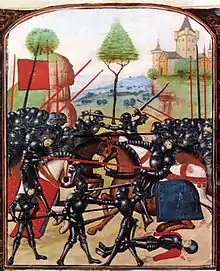Portal:London/Showcase article/06 2009
![]() The Battle of Barnet was a decisive engagement in the Wars of the Roses, a dynastic conflict of 15th-century England. The military action, along with the subsequent Battle of Tewkesbury, secured the throne for Edward IV. On 14 April 1471 near Barnet, then a small town north of London, Edward led the House of York in a fight against the House of Lancaster, which backed Henry VI for the throne. Leading the Lancastrian army was Richard Neville, 16th Earl of Warwick, who played a crucial role in the fate of each king. Historians regard the battle as one of the most important clashes in the Wars of the Roses, since it brought about a decisive turn in the fortunes of the two houses. Edward's victory was followed by fourteen years of Yorkist rule over England.
The Battle of Barnet was a decisive engagement in the Wars of the Roses, a dynastic conflict of 15th-century England. The military action, along with the subsequent Battle of Tewkesbury, secured the throne for Edward IV. On 14 April 1471 near Barnet, then a small town north of London, Edward led the House of York in a fight against the House of Lancaster, which backed Henry VI for the throne. Leading the Lancastrian army was Richard Neville, 16th Earl of Warwick, who played a crucial role in the fate of each king. Historians regard the battle as one of the most important clashes in the Wars of the Roses, since it brought about a decisive turn in the fortunes of the two houses. Edward's victory was followed by fourteen years of Yorkist rule over England.

Barnet stands on high ground straddling the Great North Road, the principle route between the City of London and York. Modern Barnet is a suburban development within the London Borough of Barnet, and High Barnet tube station lies at the end of a branch of the Northern Line. Today, the road by-passes the town but in its heyday, 150 stage coaches passed through the town daily between London and the North.
- More Wikipedia featured articles
- Suggest a showcase article
- View showcase article archive